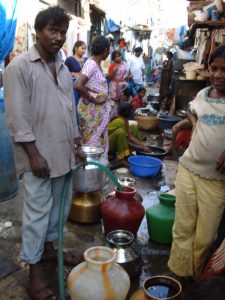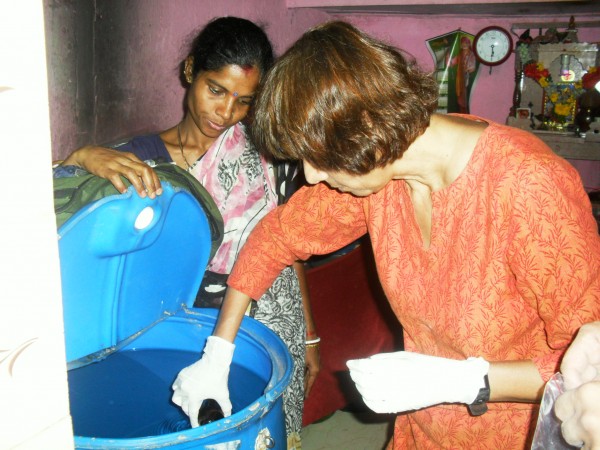Water Quality

Poor quality of water in urban slums is a significant contributor to morbidity and mortality in these communities, with most deaths of children under five years old being attributable to diarrheal illness. This study evaluating quality of water is unique in that it integrates the PUKAR team’s in-depth knowledge of the water distribution system in Kaula Bandar with high-quality laboratory testing facilities and rigorous scientific methodology. The lack of reliable and universal government provision of water in Kaula Bandar has resulted in the development of a profoundly complex system of water distribution. A few residents have tapped into large underground water pipes, and this water is then distributed to lanes in the community through a plethora of hoses, many of which are compromised by holes and tears. Within the household, water is stored in a wide variety of containers, ranging in size from 300-liter plastic drums to smaller metal vessels for drinking water.
The primary goal of this study is to determine if water sources in Kaula Bandar are contaminated with fecal coliform (disease-associated) bacteria or heavy metals, such as lead and arsenic. If water is contaminated, this study may also help identify the precise points in this complex water distribution where contamination occurs. Determination of the precise points of contamination may have implications for policy-makers as well as for future interventions in the community. Depending on the results of this study, future interventions to improve water quality in Kaula Bandar may include encouraging point-of-use water treatment (i.e., chlorination), encouraging better hand hygiene, encouraging more appropriate cleaning of household containers, replacement of compromised lane hoses, or advocacy with the Municipal Corporation of Greater Mumbai (MCGM) for a new water supply.

The PUKAR-HSPH-NYU collaboration received critical advice in the design of this project from water expert Professor John Briscoe, who is Professor of the Practice of Environmental Health at HSPH and Gordon McKay Professor of the Practice of Environmental Engineering, SEAS. For water testing, the research team used the services of Equinox Labs (ISO 9001:2008) in Prabhadevi, Mumbai. For more information, to see: www.equinoxlab.com
***An abstract from this research project was accepted for presentation by PUKAR researcher Ramnath Subbaraman at the 2011 International Conference on Urban Health in Belo Horizonte, Brazil: View Abstract